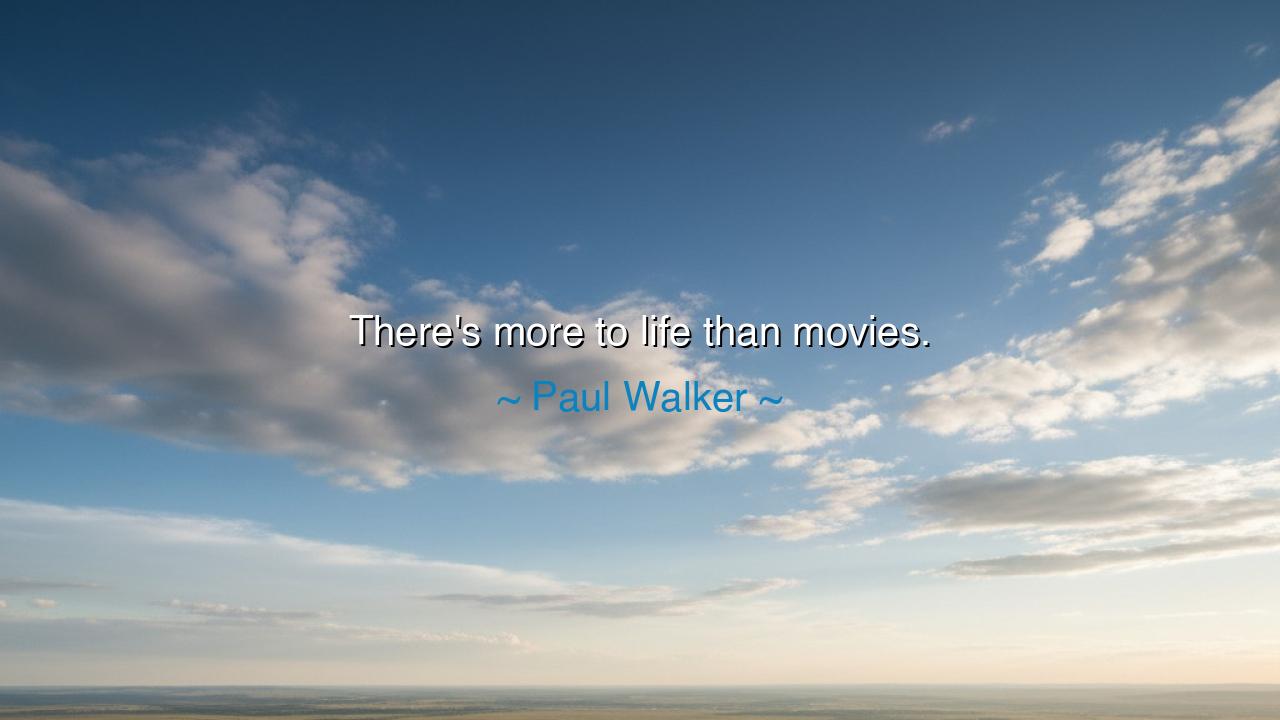
There's more to life than movies.






Hear now, O seekers of truth, for the words of Paul Walker carry a message far deeper than the surface upon which they are spoken. “There’s more to life than movies,” he said, and in these simple words lies a profound understanding of the human spirit. It is a declaration not against art or creation, but a reminder that life itself—the moments we live and the connections we form—is far richer than any screen can capture. Paul Walker, whose life was intertwined with the thrill of cinema, spoke from a place of wisdom, knowing full well that the true essence of living lies beyond the fleeting world of fame and illusion.
In our world, there are those who devote their lives to creating films, to telling stories that make us laugh, cry, and dream. Yet, even those who give of themselves to the art of storytelling, like Walker, understand that the stories on screen, no matter how grand or moving, are mere reflections of something deeper. Movies can capture the imagination, but they cannot hold the full depth of life's true meaning. For, as Walker points out, it is the lived experience—the bonds of family, the triumph over adversity, the search for purpose—that is where the true richness of life resides.
Let us look back to Homer, the great poet of ancient Greece, whose epic tales shaped an entire culture. His stories, the Iliad and the Odyssey, have echoed through the ages. They speak of heroes, of battles, of journeys undertaken in the name of honor and glory. And yet, even in these grand epics, the heroes’ greatest victories were not in the wars they fought, but in the relationships they formed, the sacrifices they made, and the personal growth they experienced. Achilles, for all his strength, was haunted by the realization that true fulfillment did not lie in the pursuit of honor alone, but in the human connections he forged and the wisdom he gained through suffering. Just as Homer’s heroes discovered, so too must we acknowledge that life is not defined by any singular pursuit, be it fame, wealth, or achievement, but by the deeper, more intimate experiences we embrace.
In the same vein, Walker’s words carry an echo of the ancient teachings of the Stoics, those wise philosophers who understood that true happiness does not come from external success or possessions. Marcus Aurelius, one of the greatest Stoic emperors, wrote that “the happiness of your life depends upon the quality of your thoughts.” He recognized that a life well-lived was not found in the pursuit of fleeting pleasures, but in the cultivation of inner peace, virtue, and meaningful relationships. Walker, too, understood that movies, fame, and worldly recognition, while enjoyable, are not the source of lasting fulfillment. The richness of life, he reminds us, is found in the deeper things—the connections we make, the lives we touch, and the legacy we leave behind in the hearts of others.
Think, too, of the great philosopher Socrates, who lived a life not of material wealth, but of wisdom and inquiry. He spent his days questioning the nature of existence, of virtue, of what it meant to live a life of meaning. Socrates never sought to accumulate fame or wealth; rather, he sought to cultivate the inner life and to inspire others to look beyond the surface of things. In this way, his life became a testament to the truth that meaning is not found in external pursuits, but in the depth of one’s own spirit and in the relationships one fosters with others.
In our own lives, we are often swept away by the demands of the world, chasing after the next achievement, the next success, the next recognition. Yet Walker's words challenge us to pause and reflect: Is this all there is to life? If we measure our worth only by what we achieve or what we accumulate, we risk missing the true richness of the human experience—the quiet moments with loved ones, the struggles that shape our character, the wisdom gained through suffering, and the beauty found in the simple act of living. It is these moments, not the fleeting accolades or the fleeting images on a screen, that form the essence of who we are and what we leave behind.
So, young ones, heed this teaching: Do not lose yourself in the pursuit of hollow things. The world may offer you many distractions, many paths that seem to promise happiness and success. But remember, true fulfillment comes not from what you achieve, but from who you become and who you share your life with. Seek not only external recognition, but the inner peace that comes from loving deeply, living authentically, and connecting with others in meaningful ways. For in this, you will find the true meaning of life, far beyond anything that can be captured in a movie.






AAdministratorAdministrator
Welcome, honored guests. Please leave a comment, we will respond soon